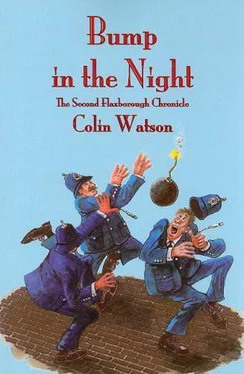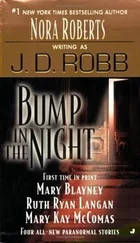“Brandy,” responded Kebble, without hesitation.
“It could be some sort of spiritualist cliche. Contact with the departed, you know.” He shook his head. “No, they would incline more to abstentionist metaphor.”
There was a pause.
“What about revenge, old chap?”
“I doubt if Ben Jonson was after quite that effect. Still, he doesn’t really come into it. Vengeance it might be. That would tie with the second quotation, at any rate.”
“The ‘dark parade’ bit?”
“Yes. You notice the future tense. Threatening, isn’t it?”
Kebble looked again at the cutting, his lips moving. Suddenly he shut his eyes tightly and groaned. “Damn me if I havn’t only just tumbled! A funeral!”
“Oh, yes,” said Purbright with mild surprise. “ ‘Tassels and coaches’—an evocative phrase.” He was about to close the book when something caught his attention. He looked up at Kebble. “Do you know anyone called Celia?”
“Celia...no, I don’t think so. Why?”
“Well, everyone thinks of this poem—or the song, rather—as ‘Drink to me only’. But its actual title is ‘To Celia’.” He picked up the cutting. “These things refer to anniversaries, don’t they, as a rule?”
“Always. The genuine ones do, anyway,” Kebble added grimly.
“Do you think that if you worked back through the files you might come across someone called Celia who died on the first of July?”
“Possibly. Provided a death notice was put in at the time.”
Kebble went over to a recess packed with tall, broad, leather-bound volumes. As he carried one back, clutching it before him so that it entirely concealed his body from neck to knee, Purbright received the grotesque impression of a book walking.
“Last year’s,” puffed Kebble, setting it with a great slam on the desk.
As if conjured by the sound. Sergeant Worple appeared at that moment in the doorway. “Good morning, Inspector,” he called across to Purbright. “They said I’d be likely to find you in here, sir.”
“Oh, they did, did they?” Purbright was beginning to wonder if the hidden army of his observers would follow him for the rest of his life, cheerfully and loyally camping at a discreet distance from wherever he might choose to visit.
“Yes, sir,” said Warple, unabashed. “Chief Inspector Larch would be much obliged if you could spare him a minute or two as soon as it’s convenient.”
Purbright said he found it convenient there and then. Before he left he suggested to Kebble that Leaper might enjoy the novelty of seeking the source of the second quotation.
At the police station, Purbright found Larch standing before his desk. He looked rather like a prison governor putting a cheerful, fatherly face on the announcement of a refused stay of execution.
“Come in, Mr Purbright. I have a message for you from the Chief Constable.” He pushed back a tray of papers from the front of the desk and perched there, his long fingers drumming his knee. “I don’t quite appreciate its significance myself, but doubtless you will understand. He asked me to tell you that the explosive he was worried about has turned up. Or rather”—Larch looked coldly amused—“somebody has discovered that it was never really missing.”
“I see,” said Purbright.
Larch’s smile broadened. “It seems that the Civil Defence Officer had several cases moved to another store two or three months ago so that he could park his golf clubs there. He’d forgotten all about it.”
“How very remiss of him.”
“Fun and games, eh, Mr Purbright? You didn’t tell me you shared the Chief’s concern over that explosive. Now I suppose you’ll have to—what’s the word?—reorientate your theories.”
“Any theories of mine about Biggadyke’s death—and I suppose that is what you’re talking about—are quite without importance. If you care to think of me as an ineffectual and discredited interloper, by all means do so. Now that this affair has translated itself, as it were, it only remains for me to do likewise.” Purbright held out his hand.
“You’re not leaving us?”
Purbright smiled pleasantly at the author of this somewhat crude acidity. “Oh, yes,” he said, “I’m afraid I must. The traffic’s simply dreadful in Flaxborough at this time of year. But I’m sure you’ll be able to handle a little local murder case without any help from me.”
The expression of sardonic jubilation faded from Larch’s face as if he had been knifed from behind. He slipped slowly from the desk, drew himself erect and gave Purbright an agonized stare. “You know that? You’re...you’re sure that’s what happened?”
“I’m virtually certain that Biggadyke was murdered. If you want to know why, I’ll tell you.”
Larch nodded absently. “Yes...yes, of course you must tell me.” His normally aggressive sibilants were now weak: the whispered evidence of a rather pathetic oral deformity. Purbright described his interview with Leaper. When he had finished, Larch walked round to his chair and sat down. He looked tired, and spoke with obvious effort.
“Mr Purbright: I’ve a favour to ask of you. It’s that you stay on here a little longer.”
“That may be difficult. After this week, impossible. Why do you ask?” Purbright had the curious feeling that he was delivering the lines of a bad play.
“Because I don’t trust myself to be able to find out the truth of this thing. You see, I am personally involved, though not in the way Hessledine seems to have thought.”
Larch’s glance fell slightly as he went on: “You won’t know this, Mr Purbright, but Biggadyke was what I believe they call a close friend of my wife’s. I happen to have learned that they’d arranged to meet that Tuesday night when he was killed. She was to have gone to his caravan. There was nothing to stop her going. I was away from home. And I understand she’s pretty punctillious about that sort of appointment.” The small twisted smile lasted only an instant. “You see, of course, what I’m afraid of. That Hilda knew what was going to happen. That...somehow or other, she’d...had a hand in it.”
Meeting his eyes, Purbright said quietly: “You know, you’re talking absolute nonsense.”
“Am I?” Larch brought his fist crashing down on the desk. “Am I, Mr Purbright? Then why in God’s name wasn’t she there when that thing went off? Why isn’t she dead too?”
Chapter Sixteen
If the sight of Purbright and Larch entering his office together and apparently in amity surprised Mr Kebble he did not show it. But nor did he say anything about the interesting discovery he had just made, which, in the absence of the man he called Old Acid-guts, he would spontaneously have announced.
Purbright, however, went straight to that very point. “The Chief Inspector and I,” he said, “are very interested in Celia, Mr Kebble. One might almost say we have high hopes of her.”
The editor glanced up at each of the policemen in turn, like a plump poodle flanked by a pair of Afghan hounds. “Celia,” he muttered. “Ah, yes...”
“Any luck?” Purbright was looking down at the open newspaper file. He caught sight of a column headed in black Gothic type.
Kebble pursed his lips and began moving a stubby, nicotine-stained finger down the page. Larch and Purbright peered at the point where it came at last to a reluctant stop.
They read: ‘July 1st, suddenly: Celia Grope, aged 20 years’.
Kebble broke the silence. “That’s the only Celia I’ve been able to find. Mind you, I’m not...” His voice tailed off unhappily as he looked up at the graven solemnity of the chief inspector’s face.
“We can’t let personal feelings worry us now, Mr Kebble,” said Larch, sententiously. “You mustn’t get the idea that you’ve let someone down, or anything of that sort.” He turned to Purbright. “I suppose you won’t have heard about that business?” He nodded towards the year-old newspaper.
Читать дальше












